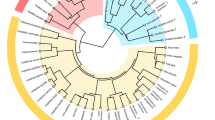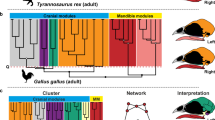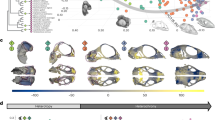Abstract
ASYMMETRY in mammalian skulls is a rare phenomenon. Differential tusk usage in elephants may result in slight skull asymmetry1, and the Odontoceti (toothed whales) invariably show marked skull asymmetry caused by suppression of the nasal passage on one side. This is carried to an extreme in the Narwhal, in which a long tusk is almost always developed on the left side only.
This is a preview of subscription content, access via your institution
Access options
Subscribe to this journal
Receive 51 print issues and online access
$199.00 per year
only $3.90 per issue
Buy this article
- Purchase on Springer Link
- Instant access to full article PDF
Prices may be subject to local taxes which are calculated during checkout
Similar content being viewed by others
References
Sikes, S. K., The African Elephant (Weidenfeld and Nicolson, London, 1971).
Hoadley, M. D., and Pearson, K., Biometrika, 21, 94 (1929).
Coolidge, H. J., Revision of the Genus Gorilla (Mem. Mus. Comp. Zool. Harvard, 50, No. 4, Cambridge, Mass., 1929).
Schaller, G. B., The Mountain Gorilla (Chicago University Press, 1963).
Author information
Authors and Affiliations
Rights and permissions
About this article
Cite this article
GROVES, C., HUMPHREY, N. Asymmetry in Gorilla Skulls: Evidence of Lateralized Brain Function?. Nature 244, 53–54 (1973). https://doi.org/10.1038/244053a0
Received:
Revised:
Issue Date:
DOI: https://doi.org/10.1038/244053a0
This article is cited by
-
Functional asymmetry of the animal brain
Neuroscience and Behavioral Physiology (1984)
-
On magnopyramidal temporal fields in the human brain?Probable morphological counterparts of Wernicke's sensory speech region
Anatomy and Embryology (1978)
-
Contribution to the study of alimentation of lowland gorillas in the natural state, in Río Muni, republic of equatorial guinea (West Africa)
Primates (1977)
-
Is craniofacial asymmetry and adaptation for masticatory function an evolutionary process?
Nature (1974)
Comments
By submitting a comment you agree to abide by our Terms and Community Guidelines. If you find something abusive or that does not comply with our terms or guidelines please flag it as inappropriate.



